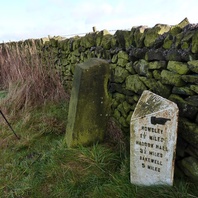
Viking Names
Great Rowsley
Great Rowsley, in the High Peak Hundred of Derbyshire, comes from either the Old Norse male personal name Hrólfr or the Old English male personal name Hroðwulf. The second element is Old English leah ‘A forest, wood, glade, clearing; (later) a pasture, meadow’, so if the first element is the Old Norse personal name then it is a hybrid place-name. The affix ‘great’ was a later addition to distinguish this Rowsley from Little Rowsley in the Darley Parish of the High Peak Hundred.
Read More
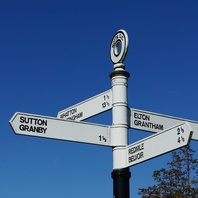
Viking Names
Granby
Granby, in the Bingham Wapentake of Nottinghamshire, comes from the Old Norse male personal name Gráni and the Old Norse element by ‘farmstead, village’. It is of interest that a document from c. 1200 records that there was a Granehou nearby and it is possible that this was the burial-mound (Old Norse haugr) of the same Gráni who gave his name to the village. Unfortunately, no such mound can be identified today.
Read More
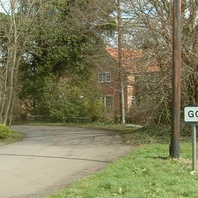
Viking Names
Gonalston
Gonalston, in the Thurgarton Wapentake of Nottinghamshire, comes from the Old Norse male personal name Gunnolfr and the Old English tun ‘farm, settlement’. It is thus a hybrid name, like Toton.
Read More

Viking Names
Maplebeck
Maplebeck, in the Thurgarton Wapentake of Nottinghamshire, is an Anglo-Scandinavian compound formed from Old English mapel ‘a maple tree’ and Old Norse bekkr ‘a stream, a beck’
Read More

Viking Names
Bigby
Bigby, in the Yarborough Wapentake of Lincolnshire, probably comes form the Old Norse male personal name Bekki and the Old Norse element by ‘farm, settlement’.
Read More
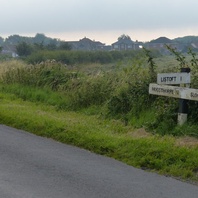
Viking Names
Sloothby
Sloothby, in the Calcewath Wapentake of Lincolnshire, is a complicated name. There are multiple possibilities for the first element of the place-name. The second element is the Old Norse element by ‘a farmstead, a village’. One suggestion is that the first element is the Old Norse byname Slóði ‘the lazy one’; however, this name is not found independently in Lincolnshire and is uncommon in Scandinavia. Another alternative is that the first element could be slóði used as a river-name, referring to a slow-moving sluggish stream. Sloothby is in the fens and a stream runs by. Furthermore, the first element could be the Old Norse element slóð ‘a track, trail’, perhaps referring to a track through the fens. Sloothby is a joint parish with Willoughby.
Read More
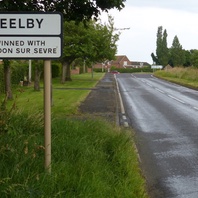
Viking Names
Keelby
Keelby, in the Yarborough Wapentake of Lincolnshire, is a Old Norse compound coming from kjǫlr ‘a keel, a ridge (of hills)’ and by ‘farmstead, village’. The village is situated on a rising piece of ground between 15 and 20 metre contours (one small patch above 20 metres). This forms a distinct elongated ‘ridge’ running south-east-north-west.
Read More
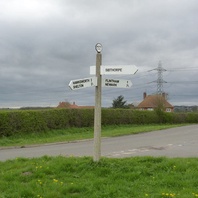
Viking Names
Sibthorpe
Sibthorpe, in the Newark Wapentake of Nottinghamshire, comes from either the Old English male personal name Sibba or the Old Norse male personal name Sibbi and Old Norse þorp ‘a secondary settlement, a dependent outlying farmstead or hamlet’.
Read More

Viking Names
Tumby
Tumby, in the Gartree Wapentake of Lincolnshire, is a difficult name. The first element may be the Old Norse male personal name Tumi, a name which occurs in several Swedish and Danish runic inscriptions. Alternatively the first element could be Old Norse tún ‘an enclosure, a farmstead’. The second element is bý ‘a farmstead, a village’.
Read More
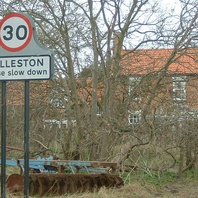
Viking Names
Rolleston
Rolleston, in the Thurgarton Wapentake of Nottinghamshire, comes from the Old Norse male personal name Hróaldr and the Old English element tun ‘farm, settlement’. It is thus a hybrid name like others nearby, such as Gonalston.
Read More
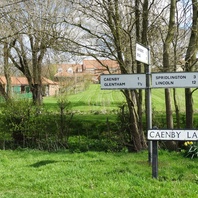
Viking Names
Caenby
Caenby, in the Aslacoe Wapentake of Lincolnshire. likely comes from the otherwise unrecorded Old Norse male byname Kafni (probably originally a byname) and the Old Norse element bý ‘a farmstead, a village’,
